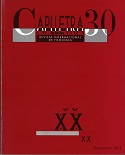Els marcadors pragmàtics compostos en el relat oral anglès i català
Article Sidebar

Main Article Content
Montserrat González
Pragmatic markers are linguistic units that the speaker uses to organize, recover, reformulate and segment the information that
s/he supplies to the hearer. They are a feature of oral rather than written discourse. They have little or no propositional meaning. By
means of pragmatic markers, the speaker transmits intentions, actions, and thoughts. They help to make a text coherent in as much as they are cues that facilitate the cognitive processing of information and constrain inferences and presuppositions. They are
multifunctional, operating at several discourse levels simultaneously: sequential, rhetorical and ideational (Redeker 1990). Their omission involves a violation of gricean cooperative principle, and the maxims of quantity and relevance in particular. The pairing of two or more pragmatic markers results into a compound pragmatic marker (CPM). These units facilitate, to a great extent, the shifts onto distinct contextual realms or discourse structures (ideational, sequential and rhetorical). Their combinatory functions result into a) a change of attentional state of the speaker or shift of cognitive frame, and b) a remarkable emphasis on the illocutionary point of the segment. When a CPM is used, the processing cost of information is lowered.
s/he supplies to the hearer. They are a feature of oral rather than written discourse. They have little or no propositional meaning. By
means of pragmatic markers, the speaker transmits intentions, actions, and thoughts. They help to make a text coherent in as much as they are cues that facilitate the cognitive processing of information and constrain inferences and presuppositions. They are
multifunctional, operating at several discourse levels simultaneously: sequential, rhetorical and ideational (Redeker 1990). Their omission involves a violation of gricean cooperative principle, and the maxims of quantity and relevance in particular. The pairing of two or more pragmatic markers results into a compound pragmatic marker (CPM). These units facilitate, to a great extent, the shifts onto distinct contextual realms or discourse structures (ideational, sequential and rhetorical). Their combinatory functions result into a) a change of attentional state of the speaker or shift of cognitive frame, and b) a remarkable emphasis on the illocutionary point of the segment. When a CPM is used, the processing cost of information is lowered.
Paraules clau
marcadors pragmàtics compostos, relat oral, anglès, català
Article Details
Com citar
González, Montserrat. “Els marcadors pragmàtics compostos en el relat oral anglès i català”. Caplletra. Revista Internacional de Filologia, no. 30, pp. 73-94, https://raco.cat/index.php/Caplletra/article/view/285363.